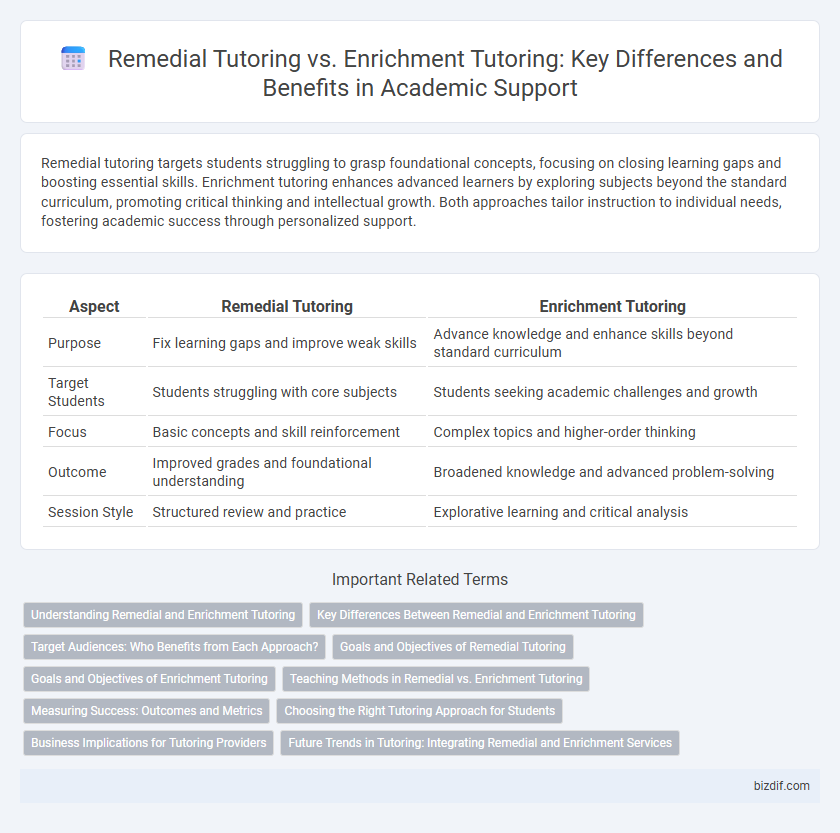Remedial tutoring targets students struggling to grasp foundational concepts, focusing on closing learning gaps and boosting essential skills. Enrichment tutoring enhances advanced learners by exploring subjects beyond the standard curriculum, promoting critical thinking and intellectual growth. Both approaches tailor instruction to individual needs, fostering academic success through personalized support.
Table of Comparison
| Aspect | Remedial Tutoring | Enrichment Tutoring |
|---|---|---|
| Purpose | Fix learning gaps and improve weak skills | Advance knowledge and enhance skills beyond standard curriculum |
| Target Students | Students struggling with core subjects | Students seeking academic challenges and growth |
| Focus | Basic concepts and skill reinforcement | Complex topics and higher-order thinking |
| Outcome | Improved grades and foundational understanding | Broadened knowledge and advanced problem-solving |
| Session Style | Structured review and practice | Explorative learning and critical analysis |
Understanding Remedial and Enrichment Tutoring
Remedial tutoring targets students who struggle with foundational skills, focusing on bridging knowledge gaps and reinforcing core concepts to improve academic performance. Enrichment tutoring, on the other hand, offers advanced learning opportunities beyond the standard curriculum, aiming to deepen students' understanding and foster critical thinking skills. Both approaches are tailored to individual learning needs, enhancing educational outcomes through personalized instruction.
Key Differences Between Remedial and Enrichment Tutoring
Remedial tutoring targets students' specific academic gaps by reinforcing foundational skills and concepts to bring them up to grade level, often focusing on core subjects like math, reading, and writing. Enrichment tutoring, in contrast, emphasizes expanding knowledge beyond the standard curriculum through advanced topics, critical thinking development, and creative problem-solving exercises. The key difference lies in remedial tutoring's goal to remediate deficiencies, while enrichment tutoring aims to deepen understanding and cultivate higher-order skills.
Target Audiences: Who Benefits from Each Approach?
Remedial tutoring primarily benefits students who struggle to meet grade-level expectations, focusing on foundational skills recovery and academic gaps. Enrichment tutoring targets advanced learners seeking to deepen knowledge and develop higher-order thinking skills beyond the standard curriculum. Tailoring sessions to these distinct audiences ensures optimized learning outcomes and personalized academic growth.
Goals and Objectives of Remedial Tutoring
Remedial tutoring focuses on addressing specific learning gaps and reinforcing foundational skills to bring students up to grade-level proficiency. Its primary goal is to remediate weaknesses in subjects such as math, reading, or writing, ensuring students can meet academic standards and succeed in subsequent coursework. This targeted support helps build confidence and prevent future learning difficulties by filling essential knowledge deficits.
Goals and Objectives of Enrichment Tutoring
Enrichment tutoring focuses on expanding a student's knowledge beyond the standard curriculum, cultivating critical thinking, creativity, and advanced problem-solving skills. Its primary goal is to challenge high-achieving learners by introducing complex concepts and fostering intellectual curiosity. This form of tutoring aims to prepare students for competitive academic environments and lifelong learning by enhancing their academic strengths and exploring diverse subjects.
Teaching Methods in Remedial vs. Enrichment Tutoring
Remedial tutoring employs targeted teaching methods focused on identifying and addressing specific learning gaps through repetitive practice, scaffolding, and mastery of foundational concepts. Enrichment tutoring uses advanced, exploratory techniques that encourage critical thinking, creativity, and application of knowledge beyond the standard curriculum. Both approaches tailor instructional strategies to meet distinct student needs, with remedial emphasizing skill reinforcement and enrichment promoting intellectual growth and curiosity.
Measuring Success: Outcomes and Metrics
Measuring success in remedial tutoring centers on improvements in foundational skills such as reading comprehension and basic math, tracked through standardized test scores and formative assessments showing skill mastery. Enrichment tutoring success is evaluated by progress in advanced critical thinking, creativity, and subject-specific knowledge, often measured by enhanced project outcomes, competitions, or higher-level coursework performance. Both approaches benefit from continuous feedback loops using personalized learning analytics to optimize student growth trajectories effectively.
Choosing the Right Tutoring Approach for Students
Choosing the right tutoring approach depends on a student's academic needs: remedial tutoring targets skill gaps by reinforcing foundational concepts, while enrichment tutoring challenges students to deepen their understanding and accelerate learning. Assessment of student performance and learning goals guides educators and parents in selecting either remedial support to improve weaknesses or enrichment programs to foster advanced skills. Tailoring tutoring strategies maximizes academic growth and helps students achieve their full potential.
Business Implications for Tutoring Providers
Remedial tutoring targets students struggling to meet grade-level standards, requiring providers to invest in specialized staff and tailored curricula, which can increase operational costs but ensure a steady demand. Enrichment tutoring focuses on enhancing advanced skills and subject mastery, often appealing to higher-income families seeking competitive advantages, allowing providers to offer premium pricing and personalized programs. Balancing these services enables tutoring businesses to diversify revenue streams and adapt to shifting market demands, optimizing profitability and client satisfaction.
Future Trends in Tutoring: Integrating Remedial and Enrichment Services
Future trends in tutoring emphasize a personalized approach that integrates remedial and enrichment services to address diverse student needs. Adaptive learning technologies and data analytics enable tutors to identify skill gaps while simultaneously promoting advanced cognitive development through enrichment activities. This holistic model aims to enhance academic outcomes and foster lifelong learning skills by combining targeted intervention with opportunities for intellectual growth.
Remedial tutoring vs enrichment tutoring Infographic

 bizdif.com
bizdif.com